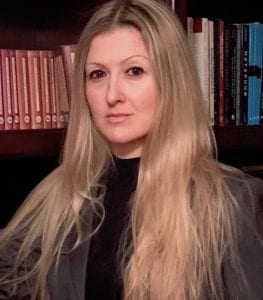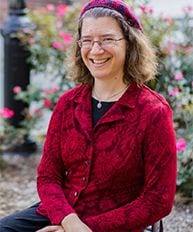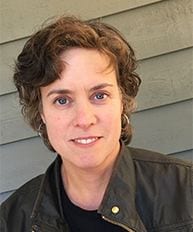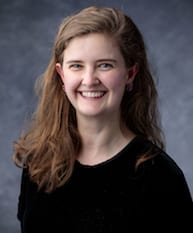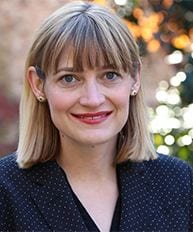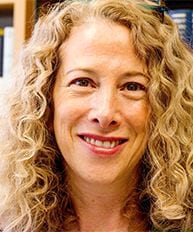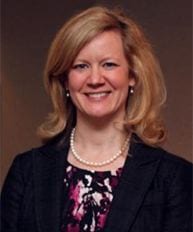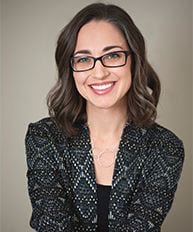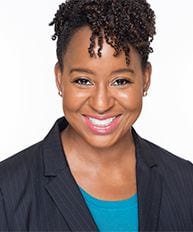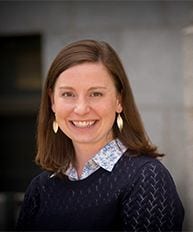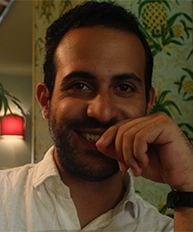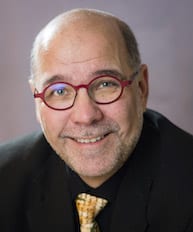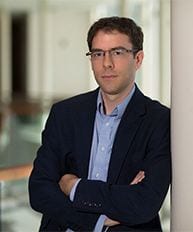Jennifer Andruska has just completed her PhD in Hebrew Bible at the University of Cambridge. She is the author of Wise and Foolish Love in the Song of Songs (Brill, 2019); “The Strange Use of דגל in Song of Songs 5:10,” VT 68 (2018); and “‘Rape’ in the Syntax of 2 Samuel 11:4,” ZAW 129 (2017). She will begin a Postdoctoral Fellowship in Ancient Judaism and Early Christianity with the Project PLURITEXT at the Université de Lorraine Metz in France this September.
Julia Watts Belser is Associate Professor of Jewish Studies in the Theology Department at Georgetown University. She specializes in the cultural study of rabbinic narrative, bringing classical Jewish texts into conversation with queer feminist theory, disability studies, and the environmental humanities. She is the author of two scholarly books, Rabbinic Tales of Destruction: Gender, Sex, and Disability in the Ruins of Jerusalem (Oxford University Press, 2018) and Power, Ethics, and Ecology in Jewish Late Antiquity: Rabbinic Responses to Drought and Disaster (Cambridge University Press, 2015). She has been awarded faculty research fellowships at the Katz Center for Advanced Jewish Studies at the University of Pennsylvania and the Women’s Studies and Religion Program at Harvard Divinity School. An ordained rabbi, she writes queer feminist Jewish theology and brings disability culture into conversation with Jewish tradition.
Fiona C. Black is Professor of Religious Studies at Mount Allison University in Sackville, New Brunswick, Canada. Her research interests include gender, sexuality, and the body in poetic Hebrew Bible texts such as The Song of Songs and Psalms; reception history of the Bible; affect and sense criticisms; and postcolonial Caribbean identities and the Bible. She has published widely on The Song especially, tracking its poetic contours in such diverse contexts as medieval manuscripts and mystical writings, contemporary art and literature, and politicized spaces such as the Bahamian post colony and the grotesque. At Mount Allison, she is engaged in curricular design and innovation, most recently researching and designing spaces to measure the impact of nontraditional learning spaces for participative pedagogies. She is also a founding director of R-PEACE, Research Partnerships for Community Engaged Learning (www.rpeace.org).
Chloe Blackshear received her PhD in Comparative Literature from the University of Chicago in 2018 and is currently a Humanities Teaching Fellow in the Department of Comparative Literature and the College there. Her current book project treats the reception of The Book of Samuel and King David’s story in twentieth-century American and European Jewish fiction, tracing unusually philological authorial methods and their literary and political affordances. Chloe teaches courses on biblical texts and literary adaptation and in the Human Being and Citizen sequence of UChicago’s Humanities Core.
Simeon Chavel is Associate Professor of Hebrew Bible at the University of Chicago Divinity School. He studies the literature of the Hebrew Bible, the religion of ancient Israel and Judea, and their relationship. His approach combines theory of literature, theory of religion, the ancient historical and social context, and early Jewish interpretation. His book Oracular Law and Priestly Historiography in the Torah (Mohr Siebeck, 2014) analyzes the combination of law and narrative in The Priestly History through a distinct set of four “oracular novellas.” A book nearing completion, God in the Eyes of Israel: A History of the Religious Imagination in Ancient Israel & Judea, traces interest in text as an agent of religious experience that reconfigures the lived spheres of family, region, royalty, and nationhood, from the Neo-Assyrian period through the Hellenistic. Another getting underway, The Voice of Biblical Composition and the Composition of Biblical Voice, will describe how the framing voice of a literary work determines its genre and coherence, and can be used to argue for the compositional integrity or composite nature of works in the Hebrew Bible.
F.W. “Chip” Dobbs-Allsopp is the James Lenox Librarian and Professor of Old Testament at Princeton Theological Seminary. He holds a BA from Furman University (1984), an MDiv from Princeton Seminary (1987), and a PhD from The Johns Hopkins University (1992). He joined the faculty of the Seminary in 1999 after spending five years teaching at Yale University (1994-99). His research interests include the historical, philological, and literary study of biblical and ancient Near Eastern literature, with special focus on poetry and Northwest Semitic inscriptions. Chip’s most recent book is On Biblical Poetry (Oxford University Press, 2015). He is currently working on a monograph-length study of the poetry of Walt Whitman, provisionally entitled, Divine Style: Walt Whitman and the King James Bible, a Biblical Scholar’s Perspective.
Kelli A. Gardner is a PhD candidate in Bible at the University of Chicago Divinity School. Her interests include gender, metaphor, and poetry in the Hebrew Bible. Her dissertation project, The Figure and Figuration of Woman in the Hebrew Bible, is motivated by the question of why Israel, as land, city, and people, is repeatedly figured as a woman, across biblical genres and moments in Israelite history. From wayward wife of Yahweh in prophetic literature to victimized widow of Lamentations to the creative reimaginings of the female body as land and cityscape in The Song of Songs and the proliferation of female figures representing wisdom and folly in Proverbs, the female persona, body, and experiences are consistently drawn on to represent the collective identity and values of Israel. A central and unique argument of this dissertation is identifying and analyzing this phenomenon as a consistent cultural metaphor creatively reused across genres: geographical/political entity is a female body. Kelli holds a BA from Canisius College in Religious Studies and Psychology and an MA from University of Chicago Divinity School.
Rhiannon Graybill is W.J. Millard Professor of Religion and Director of the Gender and Sexuality Studies program at Rhodes College in Memphis, Tennessee. She is the author of Are We Not Men? Unstable Masculinity in the Hebrew Prophets (Oxford, 2016) and is currently writing a queer feminist study of biblical women, entitled Texts after Terror. She is also co-authoring a commentary on The Book of Jonah and co-editing several volumes, including Rape Culture and Religious Studies: Critical and Pedagogical Engagements and “Who Knows What We’d Make of It, If We ever Got our Hands on It?” The Bible and Margaret Atwood.
Deborah A. Green is Greenberg Associate Professor of Hebrew Language and Literature at the University of Oregon. Her interests lie in the history, literature, and interpretation of the Hebrew Bible, particularly as it was adopted and interpreted by Jews from the Second Temple through Byzantine periods. Her book The Aroma of Righteousness: Scent and Seduction in Rabbinic Life and Literature (Penn State University Press, 2011) investigates rabbinic interpretation (midrash) of perfume and incense. She is particularly interested in the images of aromatics in the Hebrew Bible, and how the early rabbis inscribe their own daily experience with aromatics upon the interpretations they create. Her latest project focuses on Eden and other gardens in the Bible and ancient Jewish literature. She is principally interested in studying the interpretation of gardens—both real and imagined—through a variety lenses (geography, gender, the human senses, social power and dynamics, space, economics, etc.); she asks how the image of the garden becomes a central metaphor in ancient Judaism, representing heaven, the Covenant, and the Jewish people. Deborah is also the co-editor of two books, Commemorating the Dead: Texts and Artifacts in Context (Walter de Gruyter, 2008) and Scriptural Exegesis: The Shapes of Culture and the Religious Imagination: Essays in Honour of Michael Fishbane (Oxford University Press, 2009).
Karen V. Guth is Assistant Professor of Religious Studies at the College of the Holy Cross in Worcester, Massachusetts. She holds a PhD in religious ethics from the University of Virginia and an MTS from Harvard Divinity School. She is the author of Christian Ethics at the Boundary: Feminism and Theologies of Public Life (Fortress, 2015), as well as numerous articles at the intersection of political theology and feminist ethics. She is currently at work on a new book project, tentatively titled The Ethics of Tainted Legacies: Human Flourishing after Traumatic Pasts, that explores the ethical ramifications of engaging religious, cultural, and political traditions implicated in past wrongs.
Elaine T. James is Assistant Professor of Theology at St. Catherine University in St. Paul, Minnesota. She is the author of Landscapes of the Song of Songs: Poetry and Place (Oxford University Press, 2017) and co-editor of Biblical Poetry and the Art of Close Reading (Cambridge University Press, 2018), as well as the author of articles on poetry, gender, and land. She is currently working on a handbook of biblical poetry. She holds the MDiv and the PhD in Old Testament from Princeton Theological Seminary. As of July 1, she will be Associate Professor of Old Testament at Princeton Theological Seminary.
Nyasha Junior is Associate Professor in the Department of Religion at Temple University in Philadelphia. She writes, teaches, speaks, and frequently tweets on race, gender, religion, and their intersections. She is the author of An Introduction to Womanist Biblical Interpretation (Westminster John Knox Press, 2015) and Reimagining Hagar: Blackness and Bible (Oxford University Press, 2019) and the co-author of Black Samson: The Untold Story of an American Icon (Oxford University Press, 2019). Her public scholarship has appeared in The Washington Post, Buzzfeed, Religion and Politics, and other media outlets. She is passionate about grits, Star Trek, and Octavia Butler. Visit nyashajunior.com and follow her on Twitter @NyashaJunior.
Anna Marsh is a PhD Candidate in Hebrew Bible and Its Interpretation at the Jewish Theological Seminary in New York. Her dissertation is on the intersection of food, gender and power in The Book of Samuel. She currently resides in Saint Paul, Minnesota, where she works as Executive Assistant to the Bishop of the Saint Paul Area Synod of the Evangelical Lutheran Church in America (ELCA). She is an alumna of Lutheran Volunteer Corps (Baltimore 2004-2005), interned for the Minnesota Council of Churches and American Public Media’s Speaking of Faith (now OnBeing) (2006-2007), received two scholarships for language immersion study in Germany (2009 and 2012), then relocated to New York City for four years of study at the Jewish Theological Seminary. She has taught courses at Hamline University and Luther Seminary.
Aslan Cohen Mizrahi is a PhD student of Hebrew Bible at the University of Chicago Divinity School. He was born and raised in Mexico City, where he received a BA in Economics and Philosophy, and later moved to Chicago, where he received his MA in the Academic Study of Religion from the University of Chicago in 2015. His research interests center around conceptions of language and texts in biblical literature.
Martti Nissinen is Professor of Old Testament Studies at the University of Helsinki, and the Director of the Academy of Finland Centre of Excellence “Changes in Sacred Texts and Traditions.” His expertise is the prophetic phenomenon in the ancient Eastern Mediterranean, and his research interests include also matters of gender (love poetry, homoeroticism, masculinity) in the ancient Eastern Mediterranean. His books include Ancient Prophecy: Near Eastern, Biblical, and Greek Perspectives (Oxford University Press, 2017), Prophets and Prophecy in the Ancient Near East (Society of Biblical Literature, 2003), Homoeroticism in the Biblical World: A Historical Perspective (Augsburg Fortress, 1998), References to Prophecy in Neo-Assyrian Sources (State Archives of Assyria Studies, 7; Neo-Assyrian Text Corpus Project, 1998), and Prophetie, Redaktion und Fortschreibung im Hoseabuch (Neukirchener, 1991).
Yvonne Sherwood has degrees in English Literature, Jewish Studies and Religious Studies (Hebrew Bible, PhD, 1995). Having taught for over twenty years at the University of Sheffield, King’s College London, Roehampton University, and the University of Glasgow, she moved to establish a new PhD programme in Biblical Studies at the University of Kent in January 2013. She was appointed as the Speakers Lecturer at the University of Oxford in 2015 and was awarded an Honorary Doctorate from the University of Oslo in 2017. In 2018 she was visiting fellow at the Centre for Advanced Studies at Ludwig-Maximilians University in Munich and the ZfL in Berlin. Publications include Biblical Blaspheming: Trials of the Sacred for a Secular Age (Cambridge University Press, 2012) shortlisted for the American Academy Awards for Excellence Book Prize; The Invention of the Biblical Scholar: A Critical Manifesto (with Stephen D. Moore; Fortress, 2011); and The Bible and Feminism: Remapping the Field (Oxford University Press, 2017). Her current research projects are on the politics of migration and the figure of the ‘resident alien’ (a project that sets out from the figure of Hagar) and the politics of blasphemy.
Karl Shuve is Associate Professor in the Department of Religious Studies at the University of Virginia, where he teaches courses on the history of Christianity in the ancient and medieval periods. His research focuses on the intersection between the interpretation of sacred texts and the construction of gendered identities. In 2016, he published The Song of Songs and the Fashioning of Identity in Early Latin Christianity (Oxford University Press), which argues that this erotic poem was not a problematic text for many early Christian theologians, but was rather a resource that they mined as they debated the nature of the church and of the virtuous life. His current book project, Brides of Christ: The Making of a Metaphor in Late Antiquity, explores how the image of the bride of Christ shaped social relationships and spiritual practices in early and medieval Christianity.
Jeffrey Stackert is Associate Professor of Hebrew Bible at the University of Chicago Divinity School. His research focuses especially on the composition of the Pentateuch, ancient Near Eastern prophecy, cultic texts, and ancient Near Eastern law. His most recent book is A Prophet Like Moses: Prophecy, Law, and Israelite Religion (Oxford University Press, 2014). Jeff is currently working on two monographs, one on Deuteronomy and its relationship to the Pentateuch and the other on the Priestly religious imagination in the Hebrew Bible. He is also coauthoring a commentary on Deuteronomy.
Erin Galgay Walsh is finishing her Ph.D. in Early Christianity at Duke University. She specializes in Syriac language and literature, and her research interests include the reception of biblical literature, gender, and the multi-lingual environment of the late ancient eastern Mediterranean. Her dissertation examines how Narsai, Jacob of Serugh, and Romanos Melodos transformed the stories of unnamed New Testament women in their poetry. Their poetic narrations crafted biblical women into exemplars of faithful boldness for Syriac- and Greek-speaking Christians. She has prepared several translations of Narsai for publication along with essays in volumes of collected essays. Her most recent article is “Mourning Eve: The Homily On Women as Attributed to Jacob of Serugh,” Patristica Nordica Annuaria 33 (2018). For the last three years she has worked as an executive editor at the web journal, Ancient Jew Review, and she is currently a Junior Fellow in Byzantine Studies at Dumbarton Oaks Research Library and Collection of Harvard University. As of July 1, Ms. Walsh will be Assistant Professor of New Testament and Early Christian Literature at the University of Chicago Divinity School.
Sarah Zhang is Associate Professor at GETS Theological Seminary in Los Angeles, California. She was born in China and had education both in China and in the United States. She grew up with a love for literature and thirst for metaphysical questions. She started cultivating an interdisciplinary approach to biblical poetry—Lyrical Ethics as inspired by Emmanuel Levinas—when she was preparing for her dissertation on The Song of Songs at the Princeton Theological Seminary.
